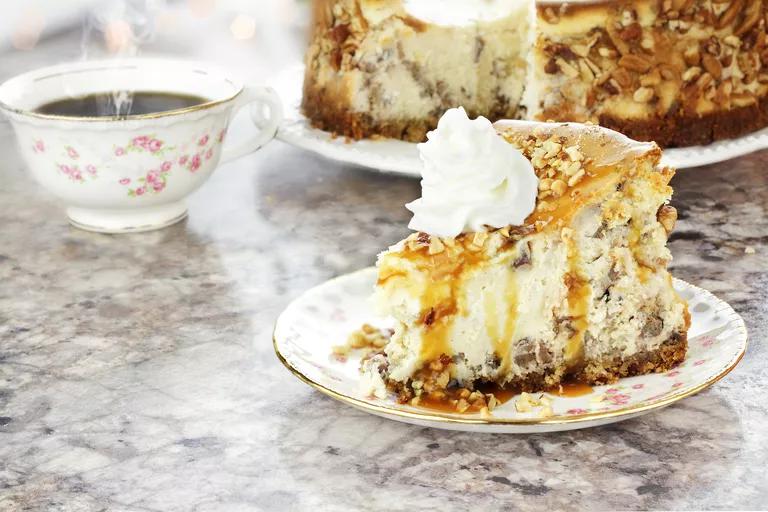这就是为什么你总是有吃甜点的空间
Sometimes when you're at the dinner table, it feels like you're under siege.
有时候,当你坐在餐桌前,你会觉得自己被包围了。
First comes a battalion of breadsticks. A brisket leaps into the breach. Then, the mashed potatoes are coming! The mashed potatoes are coming!
首先是一堆面包棒。一块牛腩进入胃中。然后,土豆泥就来了!土豆泥来了!
The main course arrives — a centerpiece dish flanked by cranberries and gravy and a constellation of carrots, cauliflower and corn.
主菜上桌了——主菜的两侧是蔓越莓、肉汁、胡萝卜、花椰菜和玉米。

StephanieFrey / Getty Images
Mercy, your belly pleads.
慈悲吧,你的肚子在恳求你。
And finally, your aunt appears in the doorway resplendent in a gravy-smeared apron. She bears the piece de resistance. Pumpkin pie crowned with a cloud of whip cream.
最后,你的阿姨出现在门口,她穿着一件粘满灰尘的围裙,光彩夺目。她承受了最大的阻力。南瓜派上面点缀着一层奶油。
The thing is, no matter how your belly moans — no matter how hard you strain to stave off the looming food coma — that pie is actually the piece de no resistance.
问题是,不管你的肚子怎么叫,也不管你多么努力地避免即将到来的食物昏迷,那块馅饼实际上是毫无抵抗力的。
You simply can't say no.
你根本不能说不。
Why is that? Why do we always find room for that belly-busting pie?
这是为什么呢?为什么我们总能找到地方容纳那块让人吃饱的派?
Science suggests it's no holiday miracle. In fact, research published in the Journal of the Norwegian Medical Association points to a simple reason why, when it comes to your stomach, there's always room at the inn. Your belly doesn't bust. It bends.
科学表明这并不是什么节日奇迹。事实上,发表在《挪威医学会杂志》上的一项研究指出了一个简单的原因,为什么说到你的胃,总是有空间的,你的肚子不会被胀大,它会弯曲。
And sugar — the stuff traditionally dumped wholesale in pies and pastries — acts as a trigger for expanding that organ to meet fresh, err... challenges.
而糖——传统上在馅饼和糕点中批发的东西——就像一个触发器,促使器官扩张以满足新鲜的挑战。
Your brain equates fullness with stomach pressure. But sugar, or more specifically glucose, tells the brain to loosen the stomach walls. That relieves some of the pressure in your belly, while allowing more food to be piled inside — namely sweets.
你的大脑把饱腹感等同于胃的压力。但是糖,或者更确切地说葡萄糖,会告诉大脑放松胃壁。这样可以减轻你肚子里的压力,同时让更多的食物堆积在肚子里——也就是甜食。
"If you eat dessert after you're actually feeling stuffed you're tricking your normal sensation of being full," the researchers noted in Science Norway. In fact, there's even a name for this situation, aptly called dessert stomach.
研究人员在《挪威科学》上指出:“如果你在真的感到饱了之后再吃甜点,你就在欺骗你正常的饱腹感。”事实上,这种情况甚至有个名字叫“甜点胃”。
But that's not the only reason why there's always room for dessert. For all the various plates of food that parade past the holiday table, it can add up to "sensory-specific satiety," defined as a "temporary decline in pleasure derived from consuming a certain food in comparison to other unconsumed foods."
但这并不是我们总是能吃到甜点的唯一原因。对于节日餐桌上摆放的各种各样的食物,加起来就是“特定感官的饱腹感”,定义为“与其他未食用的食物相比,食用某种食物所带来的愉悦感暂时下降”。
Put simply, foods with similar tastes and textures bore the senses. Introduce a lemon meringue pie in all its vibrant glory, and you may suddenly find an opening for it.
简而言之,味道和质地相似的食物会让人产生感觉。推出一款充满活力的柠檬蛋白派,你可能会突然发现它的卖点。
But when it comes to overeating — and packing on all those extra holiday pounds — the "sugar reflex" could be most dangerous.
但说到暴饮暴食,加上假日期间额外的体重,“糖反射”可能是最危险的。
"The problem is that you don't know when to stop eating dessert," added study author Arnold Berstad.
“问题是你不知道什么时候该停止吃甜点,”研究报告的作者阿诺德·伯斯塔德补充说。
It could also — if used judiciously — be a method for easing discomfort from a heavy meal. The key, the researchers suggest, is limiting dessert to just a taste.
如果使用得当,它还可以作为一种缓解暴饮暴食带来的不适的方法。研究人员指出,关键在于将甜点的口味限制在一定范围内。
That way the stomach walls slacken, giving you a little breathing room, without immediately being stuffed full of pumpkin pie.
这样你的胃壁就会松弛下来,给你一点喘息的空间,而不会马上被南瓜派填得满满的。
Of course, for anyone who's ever come face to face with homemade pumpkin pie, resistance may be futile.
当然,对于任何一个曾经面对过自制南瓜派的人来说,抵抗可能是徒劳的。







